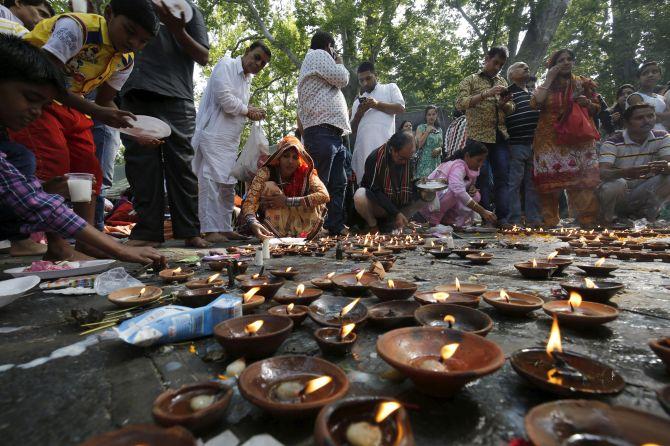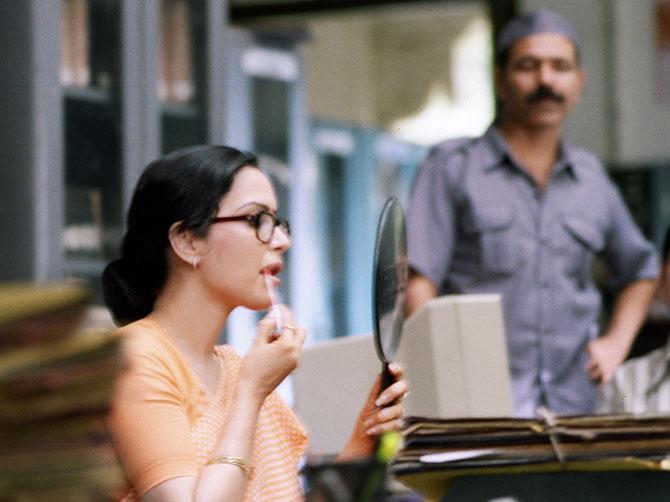'Women all over India want a safer atmosphere at the place where they go to pray or meditate.'

Advocate Maneesh Pathak recently filed a petition in the Supreme Court under Article 32 of the Constitution, seeking an extension of the Vishaka guidelines in religious places 'including ashrams, madrasas and Catholic institutions, to check the rampant rise in sexual exploitation of women in such places'.
Till 1997, a person facing sexual harassment at the workplace had to lodge a complaint under Section 354 of the Indian Penal Code, 1860, that deals with the 'criminal assault of women to outrage women's modesty' and Section 509 that 'punishes an individual/individuals' for using a 'word, gesture or act intended to insult the modesty of a woman’.
This changed after Rajasthan state government employee Bhanwari Devi, who tried to prevent a child marriage, was gang-raped by higher caste members from the community.
When she did not get justice from the Rajasthan high court and the rapists were allowed to go free, a women's rights group called Vishaka filed a public interest litigation in the Supreme Court.
In 1997, the Supreme Court passed a landmark judgment in the Vishaka vs the State of Rajasthan case, laying down guidelines to be followed by establishments while dealing with complaints regarding sexual harassment.
The court stated that these guidelines (which came to be known as the Vishaka guidelines) had to be implemented until legislation was passed to deal with the issue.
Maneesh Pathak tells Shobha Warrier/Rediff.com why he wants religious places to implement these guidelines as well:
You recently filed a PIL in the Supreme Court seeking the inclusion of the Vishaka guidelines in religious places. Did the Bishop Franco Mulakkal incident prompt you to file this petition?
I wouldn't say that case prompted me to file the PIL.
Many such incidents were reported in the past too. For example, the scandals concerning Daati Maharaj, Asaram Bapu, Ram Rahim, etc. These people had lakhs of women followers.
I felt, after all these incidents, women felt very unsafe in many religious places.
Another reason for filing the PIL is that religion is an integral part of a woman's life in India.
As you know, the Vishaka guidelines pertain only to the workplace. Women not only go to religious places as believers; they also work in these ashrams, madrasas and Christian institutions.

Does your PIL talk only about the women working there, or are the followers or devotees included as well?
Devotees also have to be included in the guidelines as past incidents show that they are the main victims of sexual exploitation.
With many such incidents happening at many religious places, women feel quite unsafe; this is not good as they go to religious places for peace of mind.
This amounts to curtailing their Right to Life and Liberty (Article 21); Right to Equality, which means they should be treated on par with men; Right to Freedom of Speech and Expression (Article 19) and also Article 25 (1) under which all are equally entitled to freely profess, practise and propagate religion.
My decision to file a PIL was to make women feel safe and stop any form of sexual exploitation in religious places.
Do you feel that exploitation of women at religious places will end by implementing the Vishaka guidelines?
I feel if we extend the guidelines to religious places -- I have requested the court to include all religious places including ashrams, madrasas and churches -- we will be able to prevent such cases to some extent.
I have asked the court to:
1. Implement the Vishaka guidelines in religious places.
2. Ensure verification of all the gurus.
3. Members of the Human Rights Commission should make periodic visits to these places.
If all these three prayers are accepted by the honourable court, I feel it will make a difference.
If the court decides to implement this in religious places, it can be extended to workplaces too.

Twenty-one years have passed since the Vishakha vs State of Rajasthan case.
Looking at the number of #MeToo stories that are coming out, do you feel the Supreme Court guidelines have made a difference to the lives of women in their workplaces?
The fact is that these guidelines were not implemented properly in the workplace due to two reasons.
One, the implementation of the guidelines and following up on a complaint are very sluggish in all workplaces.
I would say 70 per cent of the workplaces do not follow the guidelines correctly. If they did, these kinds of #MeToo incidents would not have occurred at all.
The second reason is that women need to report such crimes without fear. They shouldn't shy away from doing so.
Who is to be blamed? The woman who does not complain or the workplace that does not implement the guidelines properly?
I would say the work place has to be more responsible.
If an environment was created where a woman could courageously report a crime committed by her seniors or bosses, she would have done so.
If she is not confident about getting justice, she will refrain from complaining.
You said if the Vishaka guidelines were implemented properly, the #MeToo incidents would not have occurred. What is the proper way of implementing these guidelines?
The proper way is to create a working environment where a woman feels secure to address any situation she faces.
There shouldn't be any unwanted male pressure on any woman in the work place.
Also, there should be a grievance committee in every company and the majority of its members should be women.
The mechanism to address such an issue should be easy.
Today, a woman has to cross several hurdles again and again to finally make someone hear her story. Why do you think she uses the social media to tell her story? Because she has not been able to do so in her workplace.
If these guidelines are not being implemented properly in the workplace, do you think it will be possible to do so in a religious place?
Whether it is the workplace or the religious place, the guidelines can be implemented if the top authorities are ready to do so.
After I filed the PIL, I received a lot of positive feedback from women all over India which means they want a safer atmosphere at the place where they go to pray or meditate.










